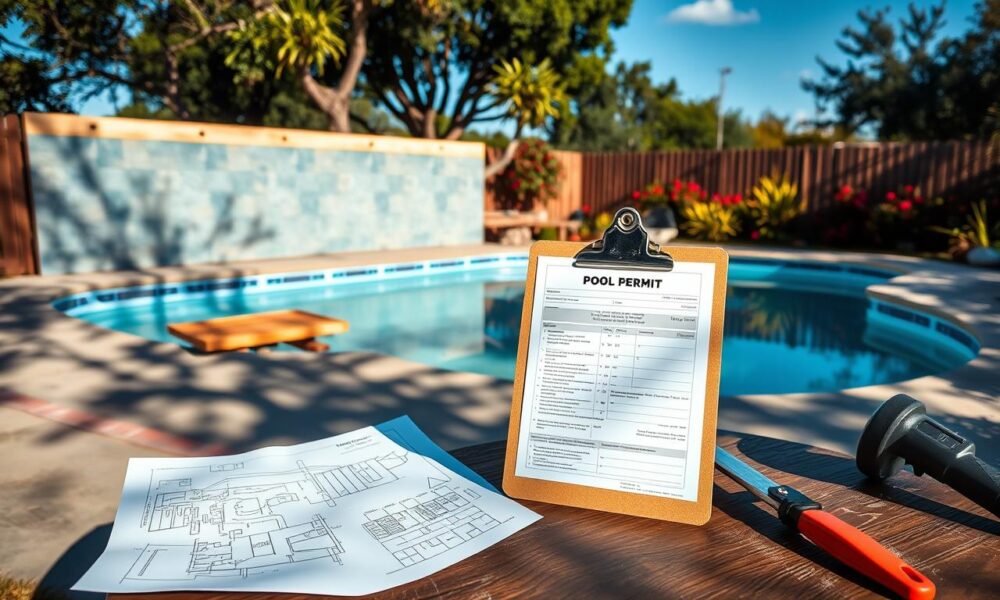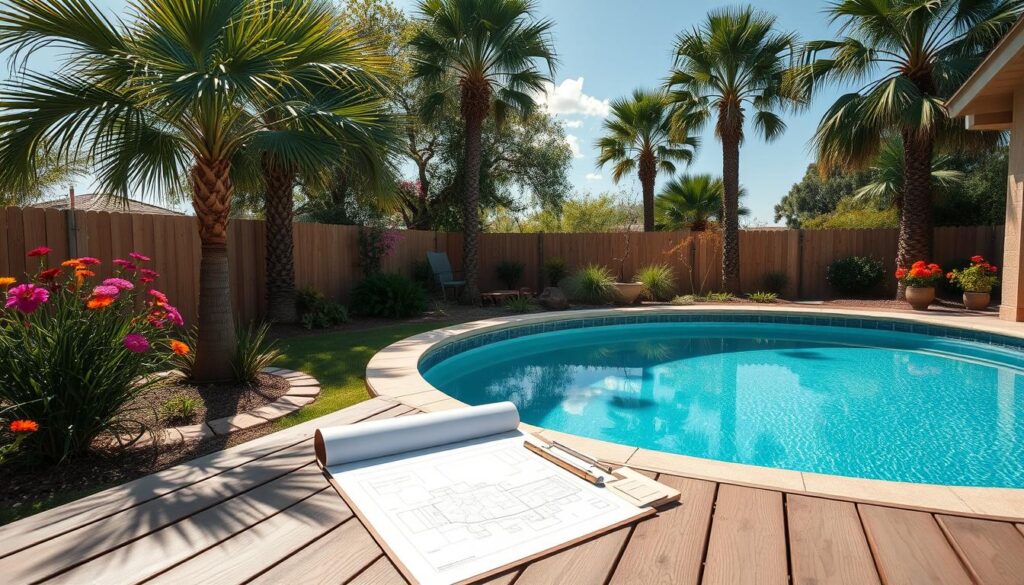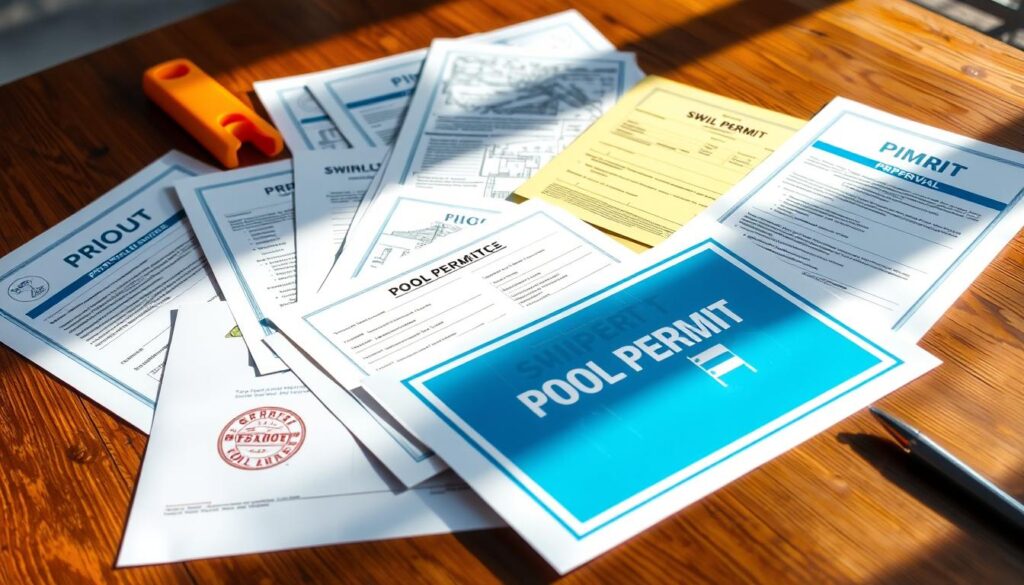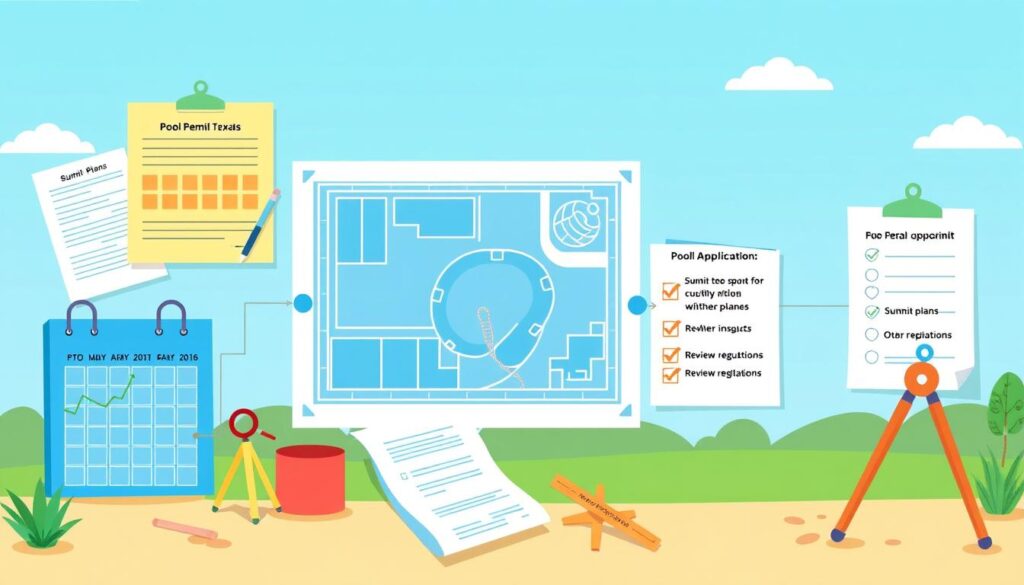
Do you need a pool permit to build a pool in Texas?
Building a pool in Texas is an exciting project. But, it’s key to know the permit rules before starting. In Texas, getting the right permits is a big part of building a pool. This article will help you understand pool permits, from state and local rules to the application process.
It will also cover the good and bad of having (or not having) a valid permit.
Key Takeaways
- Building a pool in Texas requires obtaining permits from state and local authorities.
- Permit requirements vary by city and may include submitting detailed plans, paying fees, and passing inspections.
- Obtaining a pool permit ensures compliance with safety standards and protects your investment.
- Failure to obtain a permit can result in legal and financial consequences, including fines and the need to remove the pool.
- Hiring a professional pool builder can simplify the permit acquisition process.
Understanding Pool Permitting in Texas
Building a pool in Texas means you must know the state and local rules. Texas has basic guidelines, but each city or county has its own rules. These rules can change a lot.
State and Local Regulations
At the state level, Texas has rules for pool building. These cover safety, design, and water quality. But, local areas can add their own rules. This includes permits, inspections, and fees.
Permit Requirements Vary by City
Before building a pool in Texas, check the local requirements. Each city or county has its own rules. Not getting the right Texas pool permit can cause legal and financial problems. Knowing the state pool construction laws and local pool permit requirements is key.

Types of Pool Permits Required
Building a pool in Texas means you’ll need to know about types of pool permits. You might need a building permit, an electrical permit, and a plumbing permit. It’s key to understand these pool construction permits Texas and pool installation permit requirements. This ensures your project meets state and local rules.
The types of pool permits in Texas include:
- Building Permit: Needed for the pool’s construction, like excavation, shell, and decking.
- Electrical Permit: Required for electrical parts, like the pool pump, lighting, and connections.
- Plumbing Permit: Covers the pool’s plumbing, including water supply, drainage, and gas lines.
- Fence Permit: You might need a special permit for a safety fence around the pool, depending on local laws.
Remember, pool installation permit requirements can change a lot in Texas. So, always check with your local building department. They can help make sure you have all the right pool construction permits Texas for your project.

The Application Process
Getting a pool permit in Texas is a detailed process. It makes sure your pool is safe and follows the law. The application process Texas includes sending in all the needed documents, paying fees, and having inspections during building.
Documentation and Fees
You’ll need to provide documentation like pool and site plans, and engineering specs. You might also need to give info on electrical, plumbing, and drainage systems. You’ll have to pay pool permit fees too, which depend on your pool’s size and details.
Inspection Requirements
- Inspections are key in the pool permit inspection requirements in Texas. Local authorities will check your pool at different stages, like:
- Pre-gunite inspection: Makes sure the pool structure is ready for concrete or gunite.
- Electrical inspection: Checks if the electrical system is safe.
- Final inspection: Sees if the pool and area meet all rules.
- Passing these inspections is needed to get final approval and use your pool.
Knowing the pool permit application process Texas, pool permit documentation, and pool permit inspection requirements helps keep your pool project on track. It ensures it meets all the rules.

Benefits of Obtaining a pool permit
Getting the right pool permits in Texas brings many benefits. It ensures your pool is safe and legal. It also protects your investment and might even raise your home’s value.
One key advantage is the peace of mind. Knowing your pool follows local regulations and safety standards keeps your family and guests safe. It also prevents costly fines or legal issues later on.
Also, following pool permit rules shows you’re a responsible pool owner. This can make your home more appealing if you want to list it. In some cases, a valid permit is needed for homeowners insurance.
The importance of a pool permit is clear. It protects your investment and ensures you can enjoy your pool for years. By getting the right permits, Texas homeowners can enjoy their pool with confidence and possibly increase their home’s resale value.
Penalties for Building Without a Permit
Building a pool in Texas without a permit can cause big legal and financial problems. Homeowners who skip the permit process might get stop-work orders, face big fines, or even have to tear down the pool.
Legal Consequences
Not getting a permit is against the law. Authorities can stop construction with stop-work orders. Homeowners might also get hefty fines, which can be hundreds or thousands of dollars.
In some cases, homeowners might have to demolish the unpermitted pool themselves. This adds a lot of extra money to the cost of building the pool.
Financial Implications
The cost of building a pool without a permit can grow fast. Homeowners might face increased insurance premiums or even denied coverage. This can hurt their finances for a long time.
Also, the resale value of the property can drop if there’s an unpermitted pool. Buyers might be scared off by the legal and financial risks.
Getting through the pool permitting process in Texas might seem hard. But, it’s key to avoid legal issues with unpermitted pools and the financial costs of unpermitted pool construction. Getting the right permits ensures the pool project follows the law. This protects the investment and avoids expensive penalties.
Exemptions and Special Cases
Most pool construction projects in Texas need a permit. But, there are some exceptions and special cases where you might not need one. Knowing these can help homeowners deal with the permitting process better.
Small, above-ground pools are often exempt from the usual permit rules. This is because they are simpler and less risky. But, always check with your local building department to see if this rule applies in your area.
There are also special pool permit cases for temporary or seasonal pools. This includes inflatable or portable pools used only for a short time. The rules for these situations can vary, so it’s important to look into the local laws carefully.
- Small, above-ground pools may be exempt from standard pool permit requirements in some Texas municipalities.
- Temporary or seasonal pools, such as inflatable or portable pools, may also have special permit considerations.
- It’s crucial to check with your local building department to understand the pool permit exceptions Texas and special pool permit cases that apply to your specific project.
Knowing about these pool permit exemptions and special cases can make the permitting process easier. It helps ensure your pool project follows local rules.
Hiring a Professional Pool Builder
Building a pool in Texas is easier with a professional pool builder. They have the skills to design and build a beautiful pool. They also know how to handle the pool permit knowledge needed for the process.
A good professional pool builder in Texas knows all about state and local pool rules. They help you get the right permits, keeping your project on track and avoiding legal issues. Working with a licensed pool contractor means you get help with permits, follow codes, and have peace of mind.
Expertise in Permit Acquisition
Getting pool permits can be tough, but a professional pool builder Texas makes it easy. They know what your area needs, handling all the paperwork and inspections for you. This saves you time, money, and stress.
- Comprehensive understanding of state and local pool permit regulations
- Assistance with completing and submitting the permit application
- Coordination with local authorities for inspections and approvals
- Ensuring your pool design and construction meet all code requirements
Choosing a pool contractor with permit knowledge lets you enjoy designing and building your pool. They take care of the legal and administrative parts.
Friendswood Custom Pools: Your Trusted Partner
At Friendswood Custom Pools, we’re your top choice for pool builder Friendswood TX. We’re a leading pool construction company Texas. We’ll help you through the pool permit process, ensuring your project is safe and meets all requirements.
Our team is dedicated to giving you personalized service and expert advice. We’ll help you from the start to the end of your pool project. Together, we’ll make your outdoor space beautiful and fit your home and lifestyle.
Looking to build or renovate a pool? Friendswood Custom Pools is here for you. We know all about local rules and permits. We’ll take care of everything, so you can focus on your dream pool.
Ready to start your Friendswood Custom Pools project? Call us at (346) 485-3356 for a free consultation. See how our commitment and detail can change your outdoor space.
Conclusion
Getting a pool permit in Texas is key to a legal and safe pool. Knowing the local rules, following the application steps, and working with a trusted pool builder like Friendswood Custom Pools is important. This way, you can make your dream pool a reality while staying within the law.
To get a pool permit in Texas, you need to know the state and local rules. You must also submit the right documents and pay the fees. Plus, you have to pass the required inspections. Friendswood Custom Pools is ready to help you at every step, offering their knowledge in getting permits and managing your project smoothly.
For homeowners or professional pool builders, following the pool permit rules is crucial. It protects your investment and keeps your family safe. Call Friendswood Custom Pools at (346) 485-3356 for a free consultation. Start your pool project off right.
FAQ
Do I need a permit to build a pool in Texas?
Yes, you need permits to build a pool in Texas. These permits come from state and local authorities. The type of permit needed depends on where your pool will be.
What types of pool permits are required in Texas?
You might need several permits for your pool, like a building, electrical, and plumbing permit. Knowing what permits you need helps you apply smoothly.
What is the pool permit application process in Texas?
To apply for a pool permit, you’ll need to submit detailed plans and pay fees. You’ll also need to schedule inspections at different stages. Understanding these steps helps keep your project on track.
What are the benefits of obtaining a pool permit in Texas?
Getting the right permits ensures your pool is safe and legal. It also protects your investment and can increase your property’s value. Following local rules helps avoid fines and legal trouble.
What are the penalties for building a pool without a permit in Texas?
Building a pool without permits can lead to serious problems. You might face stop-work orders, fines, and even have to tear down the pool. Knowing these risks helps you decide to get the right permits.
Are there any exemptions or special cases for pool permits in Texas?
Sometimes, you don’t need a permit for certain pools, like small above-ground ones. But, always check local rules to see if your pool qualifies for an exemption.
How can a professional pool builder help with the permit process in Texas?
Working with a skilled pool builder can make getting permits easier. They know the local rules well and can help with the application and inspections. This ensures your project goes smoothly.

